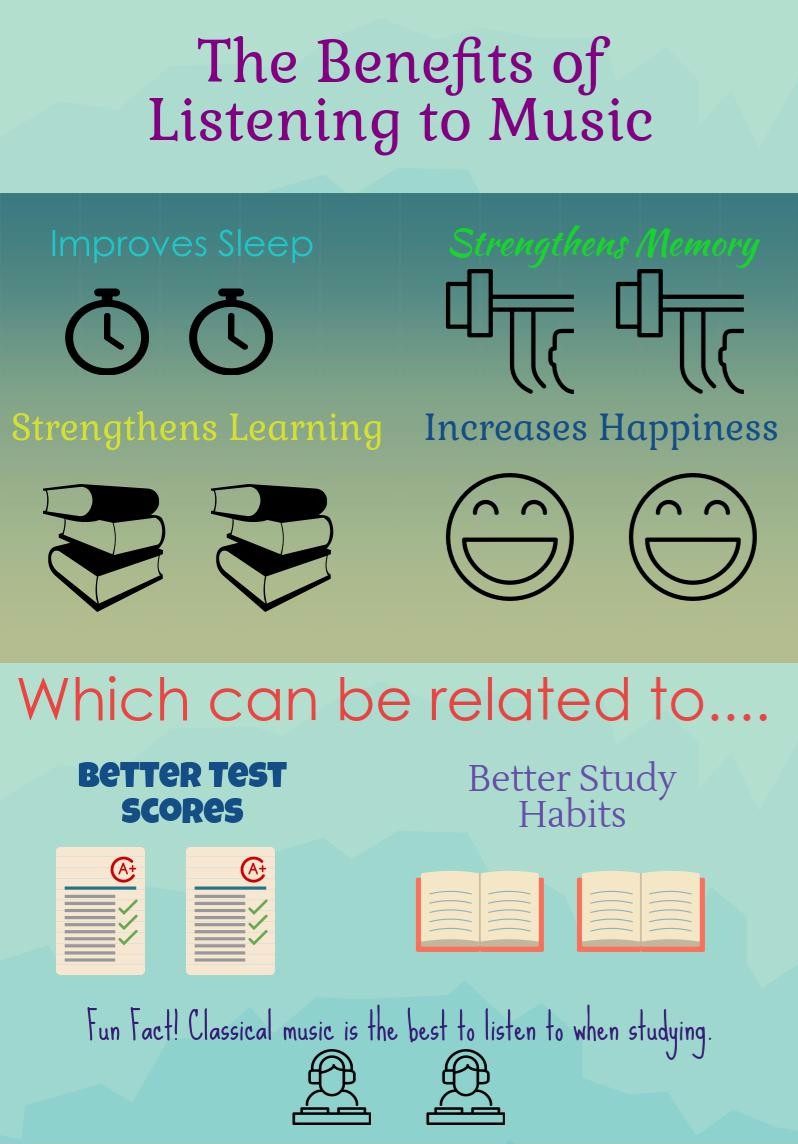Walking on campus, it’s easy to spot the hoards of students meandering through the halls with their headphones plugged in, lost in the music.
Music has become widely accessible to all, allowing students to use it wherever and whenever. Students are able to listen to music while studying or completing homework, jamming out to their favorite tunes or humming to soft acoustic.
“When I do homework at night, I like to listen to acoustic music, but if I end up having to do homework in the morning, I have to listen to rap music because it helps me wake up. Music also helps me focus because people won’t disturb me if they see I have my headphones in,” said senior Katrina Talavera.
Unknown to many, music has many health and academic benefits that have improved the lives of listeners. Music is known to increase happiness levels, strengthen learning and memory, and improve sleep, according to a Harvard University study.
“Listening to music relaxes you and can make you feel more energetic. It can also motivate you to keep working and can push you to work on harder tasks,” said chemistry teacher Felix Gandara-Guzman.
High school is a place known for recurring mental breakdowns and sleepless nights doing homework, creating a stressful environment for students. As the smell of the holidays and summer becomes increasingly apparent near the end of each semester, the grit and nerves of each student gearing up for finals are strong, and students begin to plug in their headphones for a period of intense studying and reviewing.
“Research finds that listening to soothing music can decrease blood pressure, heart rate, and anxiety levels in heart patients,” according to the University of Maryland Medical Center.
While learning that music can strengthen memory and improve sleep may seem irrelevant to the average adolescent, an increase in sleep time and memory strength have a direct effect on test scores, according to research from the University of Minnesota. This could further help students as the end of the semester draws near and finals become an increasing worry.
For students who have problems studying or performing well on their finals, listening to music can help students stay focused and retain the vital information needed for taking a test.
According to Florida Atlantic University, “Music is found to help people perform better in high-pressure situations, such as the bi-annual high-pressure event that is finals.”
For students who want to know which genre is the most effective for studying, research from the Duke Cancer Institute shows that classical music has been found to be the best type of music to listen to while studying or participating in lectures.
While some teenagers consider classical music uninteresting, others believe that listening to classical music helps them focus the most.
“I like to listen to classical music when I do homework because the addition of lyrics in songs distracts me from what I’m trying to work on,” said 11th grader Madison Myers.
Although many students believe that listening to music is necessary in order to remain focused on homework and projects, some believe that music can only be beneficial if the work that needs to be done is simple.
“I’ll only sometimes listen to music while I work. If the work I have to do is very attention-grabbing, I won’t listen to music. If the work is something casual that I can just do on the side, then I’ll listen to music,” said sophomore Arjun Grewal.
The benefits of music are endless. While music may be beneficial to health, music can also be a much-needed friend at the end of the semester when the tireless routine of studying and reviewing turns into a lifestyle for students.























